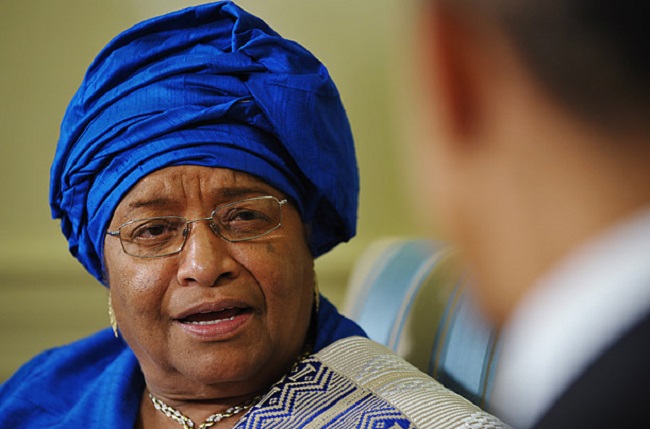Liberian government submits $604m budget
Posted by admin on Tuesday, June 2, 2015 · Leave a Comment

Liberian President Ellen Johnson Sirleaf
Liberia’s Finance and Development Planning Ministry on Tuesday presented the 2015/2016 Draft National Budget in the tune of US$604 million to the Speaker of the House of Representatives, J. Alex Tyler.
Presenting the budget, Deputy Finance Minister for Fiscal Affairs Dr. James Kollie, expressed the hope that the legislators will peruse it, make their input and subsequently pass it into Law.
Kollie also submitted a bill on behalf of the Liberian President Ellen Johnson-Sirleaf to the speaker, seeking the dissolution of some functionaries of government he described as dormant.
Although Kollie did not name the institutions to be dissolved, he said the step was necessary considering the financial constraints facing the government.
Receiving the draft budget, Speaker Tyler indicated that though the presentation of the document to the legislature was one month late, he was happy that the executive branch of the government finally submitted it.
He assured that he will transmit the budget to the plenary for submission to the House Committee on Ways, Means and Finance for scrutiny, after which it will advise the plenary to determine a decision.
Meanwhile, the office of the presidency, the Executive Mansion, in a press release issued earlier noted that the draft budget is the first year estimate of Liberia’s second Medium Term Expenditure Framework (MTEF) budget program which supports the Agenda for Transformation (AfT), the post-Ebola Economic Stabilization and Recovery Plan (ESRP), as well as, the UNMIL transition program.
The cabinet, in its meeting of Saturday, May 30, approved the draft budget based on a total projected resource envelop of US$604.04 million.
This amount represents Domestic Revenue of US$465.61million; Grants/Budget Support of US$66.23 million; Borrowing of US$58.61; and Carry-forward (surplus from FY2014/15) of US$13.58 million.
Along with the approval of the projected resource envelop, the Cabinet also agreed that key areas of expenditure will include debt repayment (US$32.5 million); payment of salaries across the government (US$252.1 million); Social Development Fund and other pass through (US$23.2 million); Health Sector Strengthening (US$73.0 million); Education Sector Support (US$79.4 million) and Security & Rule of Law (US$90.1 million), including (US$15 million for UNMIL Transition), as First Claims on the resource envelop.
Other key areas of funding agreed by the Cabinet include the Government of Liberia’s (GoL) contribution (Counterpart Funding) to ongoing donor financed public investment projects through loans and grants (US$24.5 million), as well as, GoL’s Grants and Transfers to various institutions and entities (US$85.7 million) that contribute to Liberia’s socio-economic reconstruction.
In support of major Public Sector Investments intended to advance Liberia’s post-Ebola recovery, growth, and development, the Cabinet agreed to fund road construction and maintenance (US$44.3 million, including US$17.3 million as GoL’s contribution to donor funded projects), renovation of public buildings (US$9 million); expansion of electricity (US$2.4 million); district development projects throughout the country – through the National Legislature (US$10.9 million); water & sanitation (US$2.3 million); beach & waterways cleaning (US$1million); human capacity building (US$2 million); private sector development (US$1.5 million); National Low Cost Housing Project (US$1.5 million); LWSC Water Project (US$1.0 million); renovation works at BWI (US$1 million); renovation works at Tubman University (US$1 million); and a host of other key interventions critical for the delivery of social services and economic transformation.
Consistent with its Open Budget Initiative of the Ministry of Finance and Development Planning, the Draft National Budget, after submission to the National Legislative on Monday, June 1, 2015, will be available on its website (www.mfdp.gov.lr) for public access.
Citizens are encouraged to fully participate in these budget discussions by engaging with their representatives to ensure that the Final National Budget is representative of the country’s needs and aspirations, particularly considering the socio-economic impact caused by the Ebola virus disease.
Liberian Government


